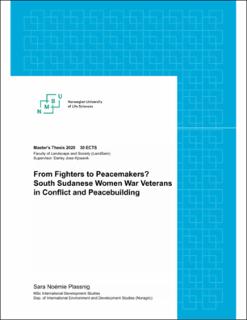| dc.contributor.advisor | Kjosavik, Darley Jose | |
| dc.contributor.author | Plassnig, Sara Noémie | |
| dc.coverage.spatial | South Sudan | en_US |
| dc.date.accessioned | 2021-02-03T11:58:56Z | |
| dc.date.available | 2021-02-03T11:58:56Z | |
| dc.date.issued | 2020 | |
| dc.identifier.uri | https://hdl.handle.net/11250/2725976 | |
| dc.description.abstract | Women war veterans in South Sudan were active in armed conflicts at the front as well as in peacebuilding efforts in their home communities. In 2000, the United Nation Security Council Resolution (UNSCR) 1325 on Women, Peace and Security (WPS) was adapted to include women with their unique conflict experiences and needs in decision-making positions in conflict resolution. Twenty years later, this thesis explores how efforts linked to UNSCR 1325 are implemented in the case study of South Sudanese women war veterans. I explore factors within the Disarmament, Demobilisation and Reintegration (DDR) programme which facilitated or hampered benefits for former women soldiers in the country, contributed to or restrained their meaningful participation in peace processes, and how their contributions to combat and peace have been acknowledged. To answer the research questions, eighteen qualitative interviews were conducted. Ten South Sudanese women war veterans who had participated in DDR and local peace processes as well as eight WPS experts were interviewed. In this process, I identified the following factors which deprived women from benefits intended by the DDR programme: lacking security at DDR sites, insufficient theoretical training, culturally insensitive childcare services, the prevention of a stable income and the failure to foster basic security in South Sudan. The thesis concluded that achievements by women war veterans in combat and peacebuilding received only little attention as they continue to be side-lined in the national peace process. By applying the Feminist Peace and Conflict Theory (FPCT) in the analysis, I identified patriarchal structures and the hierarchical order in the South Sudanese society as well as the neoliberal approach in international peacebuilding as potential root causes for the lacking implementation of UNSCR 1325 on the ground. | en_US |
| dc.description.sponsorship | NORAD | en_US |
| dc.language.iso | eng | en_US |
| dc.publisher | Norwegian University of Life Sciences, Ås | en_US |
| dc.rights | Attribution-NonCommercial-NoDerivatives 4.0 Internasjonal | * |
| dc.rights.uri | http://creativecommons.org/licenses/by-nc-nd/4.0/deed.no | * |
| dc.subject | International Development Studies | en_US |
| dc.subject | Global Development | en_US |
| dc.subject | Peace and Conflict Studies | en_US |
| dc.subject | Gender Studies | en_US |
| dc.subject | South Sudan | en_US |
| dc.subject | Peacebuilding | en_US |
| dc.subject | Conflict Resolution | en_US |
| dc.subject | Women War Veterans | en_US |
| dc.subject | Female Soldiers | en_US |
| dc.subject | Feminist Theory | en_US |
| dc.subject | Peace Process | en_US |
| dc.subject | Inclusive Peacebuilding | en_US |
| dc.subject | DDR | en_US |
| dc.subject | Resolution 1325 | en_US |
| dc.title | From fighters to peacemakers? : South Sudanese women war veterans in conflict and peacebuilding | en_US |
| dc.type | Master thesis | en_US |
| dc.subject.nsi | VDP::Social science: 200 | en_US |
| dc.description.localcode | M-DS | en_US |

